Reggae music offers profound insights into social justice and unity, resonating with audiences worldwide. Originating in Jamaica in the late 1960s, it evolved from ska and rocksteady. The genre conveys powerful social messages, addressing poverty and injustice. Its global influence is marked by iconic artists and diverse sub-genres that reflect cultural narratives and inspire movements for change.
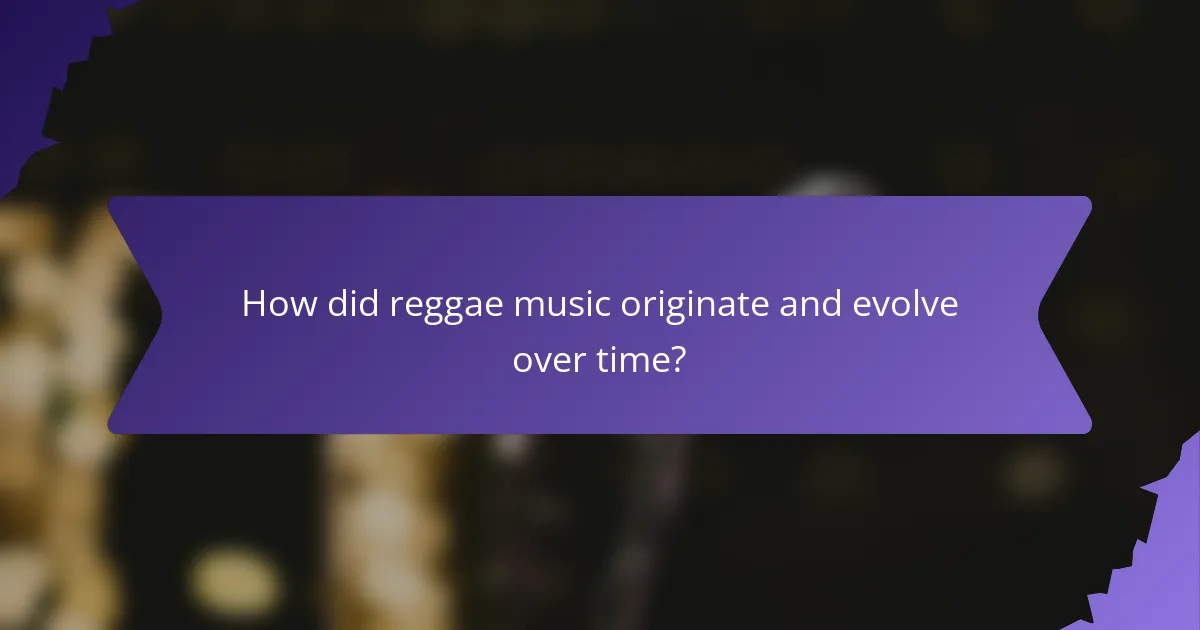
How did reggae music originate and evolve over time?
Reggae music originated in Jamaica in the late 1960s, evolving from earlier genres like ska and rocksteady. It embodies social and political messages, addressing issues such as poverty and injustice. The genre gained global influence through artists like Bob Marley, who popularized reggae’s unique sound and themes. Over time, reggae diversified into sub-genres, such as dancehall and roots reggae, while maintaining its core attributes of rhythm and lyrical depth.
What cultural and social factors influenced the birth of reggae?
Cultural and social factors such as colonial history, economic struggles, and African heritage significantly influenced the birth of reggae. The genre emerged in Jamaica during the 1960s, reflecting the island’s social tensions and aspirations for freedom. Rastafarian beliefs played a unique role, promoting messages of resistance and unity. Reggae also drew from ska and rocksteady, blending musical styles to express the struggles of marginalized communities. The global influence of reggae further expanded its reach, spreading messages of peace and social justice worldwide.
Which key artists and movements shaped early reggae?
Key artists and movements that shaped early reggae include Bob Marley, Peter Tosh, and the Rastafarian movement. Bob Marley popularized reggae globally, blending social messages with musical innovation. Peter Tosh emphasized political themes and social justice in his work. The Rastafarian movement infused reggae with spiritual and cultural significance, promoting messages of unity and resistance. Other influential figures include Toots and the Maytals, whose energetic style helped define the genre. The emergence of ska and rocksteady laid the groundwork for reggae’s development, creating a unique sound that resonated with audiences worldwide.
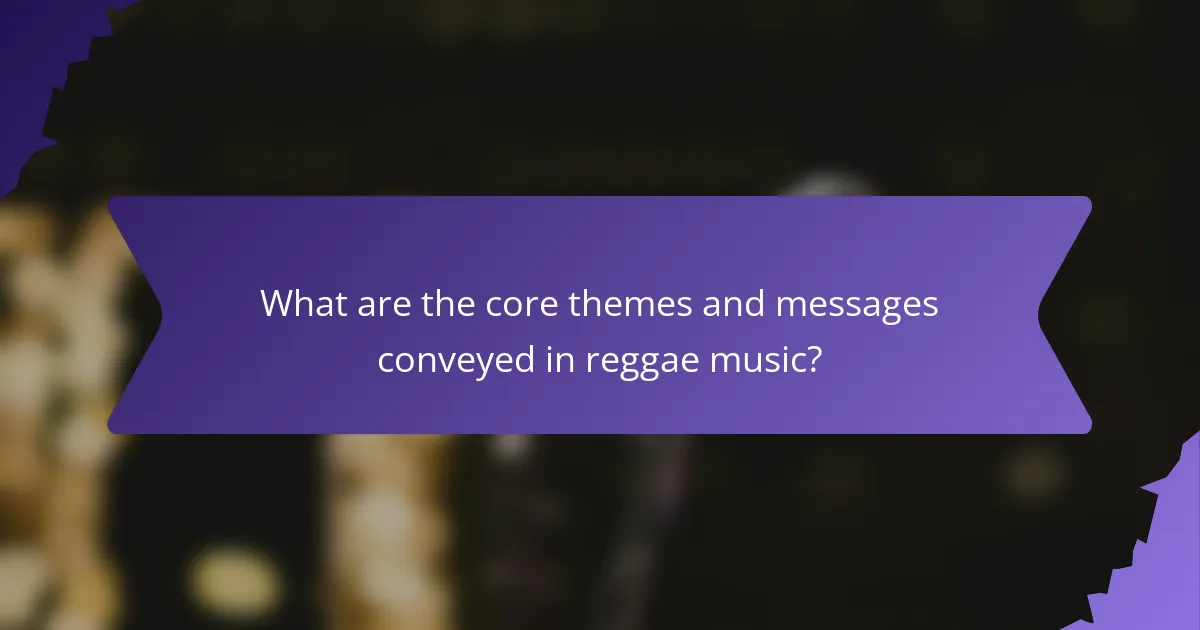
What are the core themes and messages conveyed in reggae music?
Reggae music conveys core themes of social justice, unity, and resistance against oppression. It often addresses issues like poverty, inequality, and human rights, reflecting the struggles of marginalized communities. The genre promotes messages of peace and love, encouraging listeners to seek harmony and understanding. Additionally, reggae’s influence extends globally, inspiring movements for social change and cultural expression across diverse societies.
How does reggae address social justice and political issues?
Reggae addresses social justice and political issues by promoting messages of resistance, equality, and empowerment. Originating in Jamaica, reggae artists like Bob Marley used their music to highlight social injustices and advocate for change. Lyrics often reflect struggles against oppression, poverty, and discrimination, resonating with global audiences facing similar challenges.
The genre emphasizes unity and collective action, encouraging listeners to engage in social and political movements. Reggae’s roots in Rastafarian culture further amplify its messages of resistance against colonialism and systemic inequality. As a result, reggae has become a powerful tool for raising awareness and inspiring activism worldwide.
Notably, reggae festivals and events often serve as platforms for discussing social issues, fostering community engagement. The genre’s global influence has led to collaborations with various artists, further spreading its messages of justice and peace across cultures.
What role does spirituality play in reggae lyrics?
Spirituality plays a significant role in reggae lyrics, emphasizing themes of love, unity, and social justice. Reggae artists often draw from Rastafarian beliefs, which promote a deep connection to spirituality and consciousness. This influence manifests in lyrics that advocate for peace, resistance against oppression, and a return to roots. The unique attribute of reggae is its ability to blend spiritual messages with everyday struggles, making it a powerful tool for social commentary. As a result, reggae transcends mere entertainment, serving as a voice for the marginalized and a medium for spiritual expression.
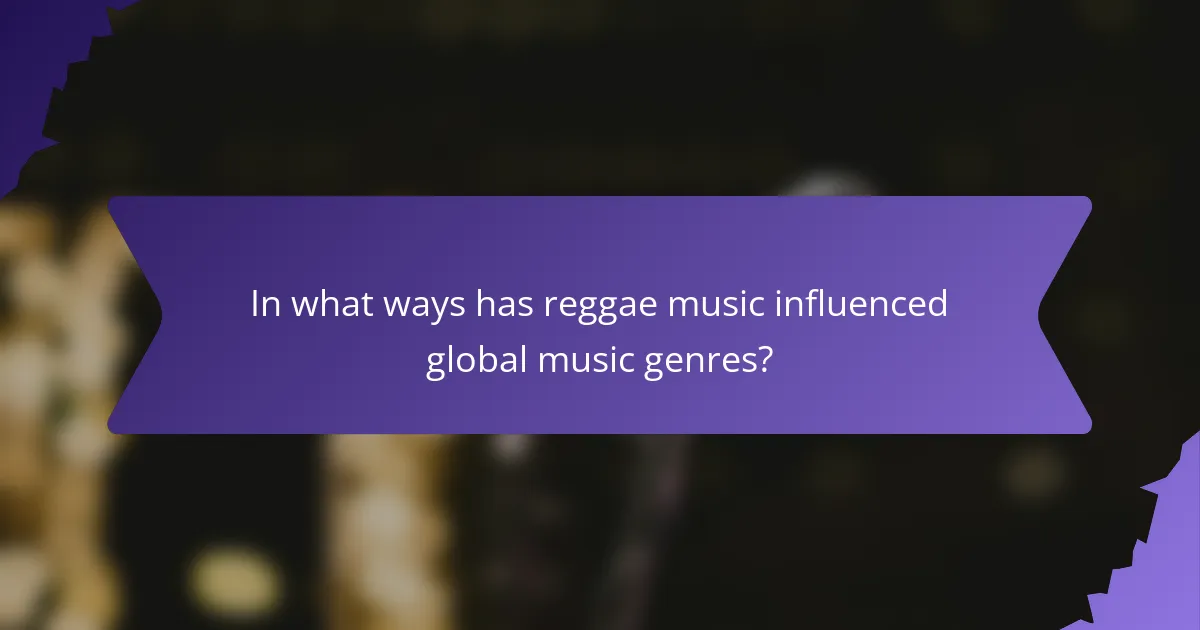
In what ways has reggae music influenced global music genres?
Reggae music has significantly influenced global music genres through its distinctive rhythms, social messages, and cultural elements. Its syncopated beats and bass lines have shaped genres like rock, hip-hop, and pop. The genre’s themes of resistance and unity resonate in various musical expressions worldwide. Reggae’s incorporation of Rastafarian culture and spirituality has also inspired artists across diverse backgrounds, promoting messages of peace and social justice. As a result, reggae’s impact extends beyond music, influencing fashion, art, and social movements globally.
Which international artists have adopted reggae elements in their work?
Many international artists have incorporated reggae elements into their music, enhancing its global reach. Notable examples include The Police, whose hit “Roxanne” features reggae rhythms, and Michael Franti, blending reggae with hip-hop. Other artists like Sean Paul and Shaggy have popularized reggae fusion, while Bruno Mars and Ed Sheeran have also drawn inspiration from reggae sounds. This cross-genre influence highlights reggae’s adaptability and enduring appeal worldwide.
How has reggae impacted cultural movements outside of Jamaica?
Reggae has significantly influenced cultural movements worldwide by promoting social justice and unity. Its messages of resistance resonate across diverse communities, inspiring movements such as civil rights and anti-apartheid. For example, artists like Bob Marley became symbols of peace and activism, impacting global perceptions of social issues. Reggae’s unique rhythms and themes have fostered cross-cultural collaborations, blending with genres like hip-hop and punk, further expanding its reach. This global influence continues to inspire new generations, highlighting reggae’s enduring legacy in advocating for change.
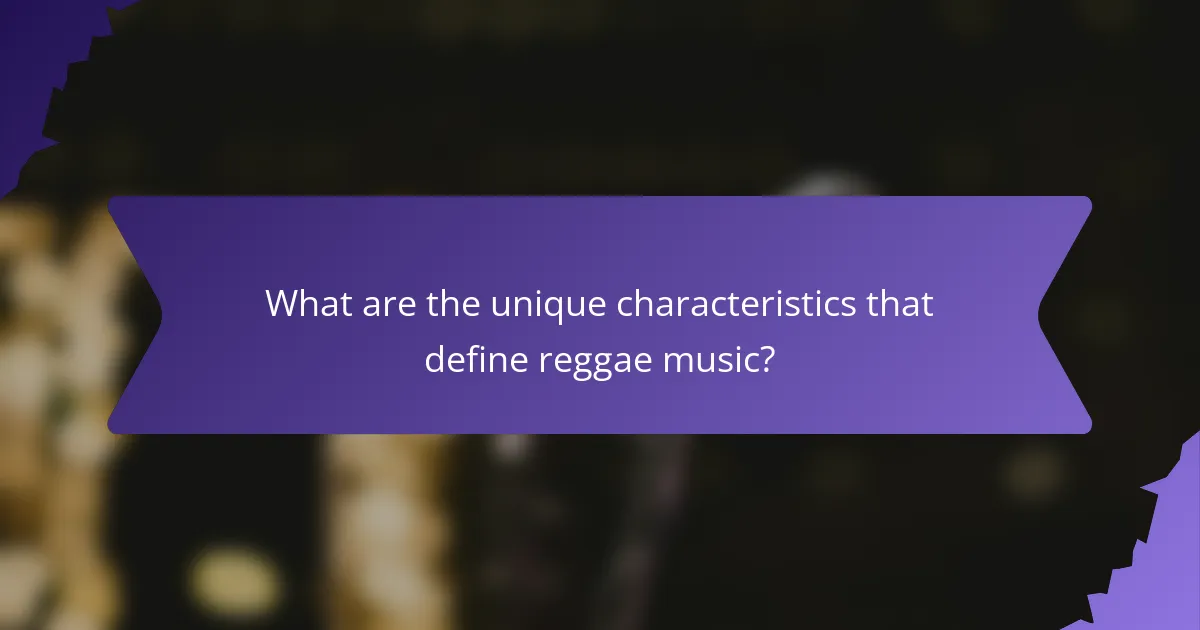
What are the unique characteristics that define reggae music?
Reggae music is defined by its distinctive rhythm, socially conscious lyrics, and cultural roots. Originating in Jamaica in the late 1960s, reggae emphasizes offbeat rhythms and a strong bass line. The genre often conveys messages of resistance, love, and unity, reflecting the struggles and aspirations of marginalized communities. Unique attributes include its association with Rastafarian culture and the use of specific musical instruments like the guitar and drums. Reggae’s global influence has led to various fusion genres, showcasing its adaptability and enduring appeal.
How do rhythm and instrumentation distinguish reggae from other genres?
Reggae is distinguished from other genres by its unique rhythm and instrumentation. The genre features a distinctive offbeat rhythm known as the “one drop” and a prominent bassline. This rhythm creates a laid-back, syncopated feel that is central to reggae’s identity. Instrumentation often includes electric guitars, keyboards, and horns, which contribute to its rich sound. The combination of these elements reinforces reggae’s cultural roots and social messages, setting it apart from genres like rock or pop.
What are the distinctive vocal styles found in reggae?
Distinctive vocal styles in reggae include a relaxed, syncopated rhythm, often characterized by a conversational tone. Singers frequently use a melodic approach, blending spoken word and singing, which conveys social messages effectively. Unique attributes include the use of call-and-response techniques and a heavy emphasis on emotional expression. Rarely, artists may incorporate elements from other genres, enhancing the reggae sound while maintaining its core identity.
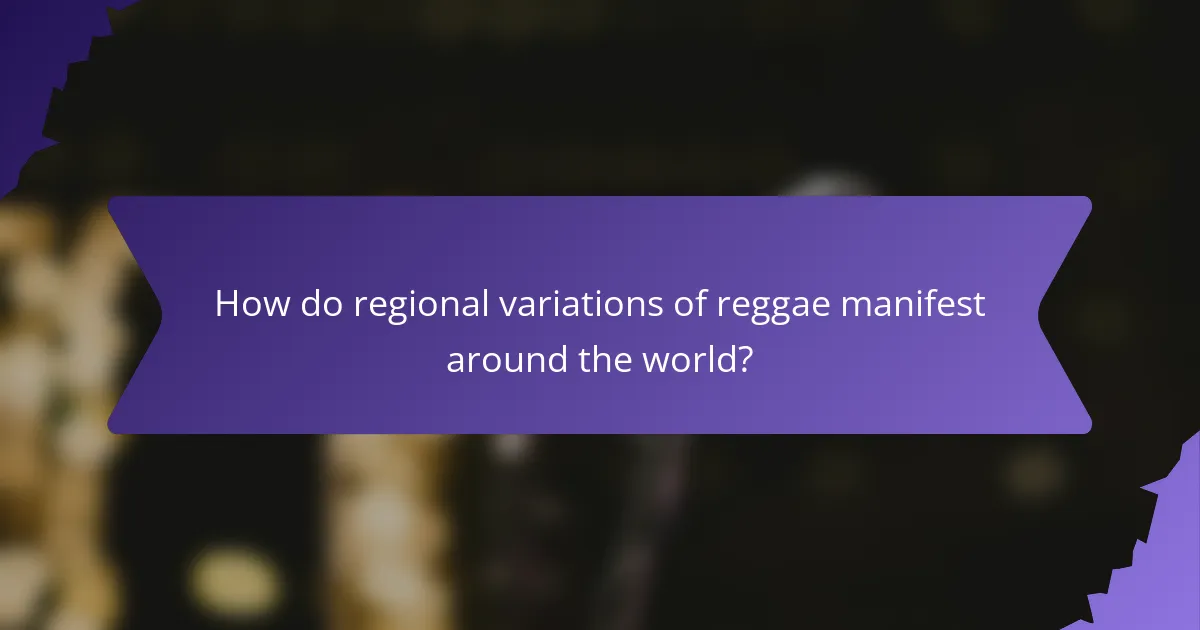
How do regional variations of reggae manifest around the world?
Regional variations of reggae reflect diverse cultural influences and social issues. In the UK, reggae incorporates elements of ska and dub, emphasizing themes of racial identity. In Africa, reggae often addresses political struggles and social justice, resonating with local experiences. In Japan, reggae blends with traditional sounds, creating a unique fusion that showcases local artistry. Each region adapts reggae to express its own cultural narratives, making the genre a global voice for unity and resistance.
What are the unique traits of reggae in the UK compared to Jamaica?
Reggae in the UK showcases distinct traits compared to its Jamaican roots. UK reggae often emphasizes fusion with other genres, like punk and dub, creating a unique sound. The social messages in UK reggae reflect local issues, such as multiculturalism and identity, differing from Jamaica’s focus on Rastafarian themes. Additionally, the UK scene has a vibrant live music culture, with numerous festivals and venues dedicated to reggae, fostering community engagement. This contrasts with Jamaica, where reggae is deeply embedded in everyday life and cultural identity.
How has reggae been integrated into Latin American music scenes?
Reggae has significantly influenced Latin American music through fusion genres and cultural exchange. It has integrated into local styles, creating unique sounds like reggae en Español. Artists from various Latin American countries adopt reggae’s rhythms and themes, promoting social messages of unity and resistance. This blend enriches regional music scenes, showcasing reggae’s global impact.
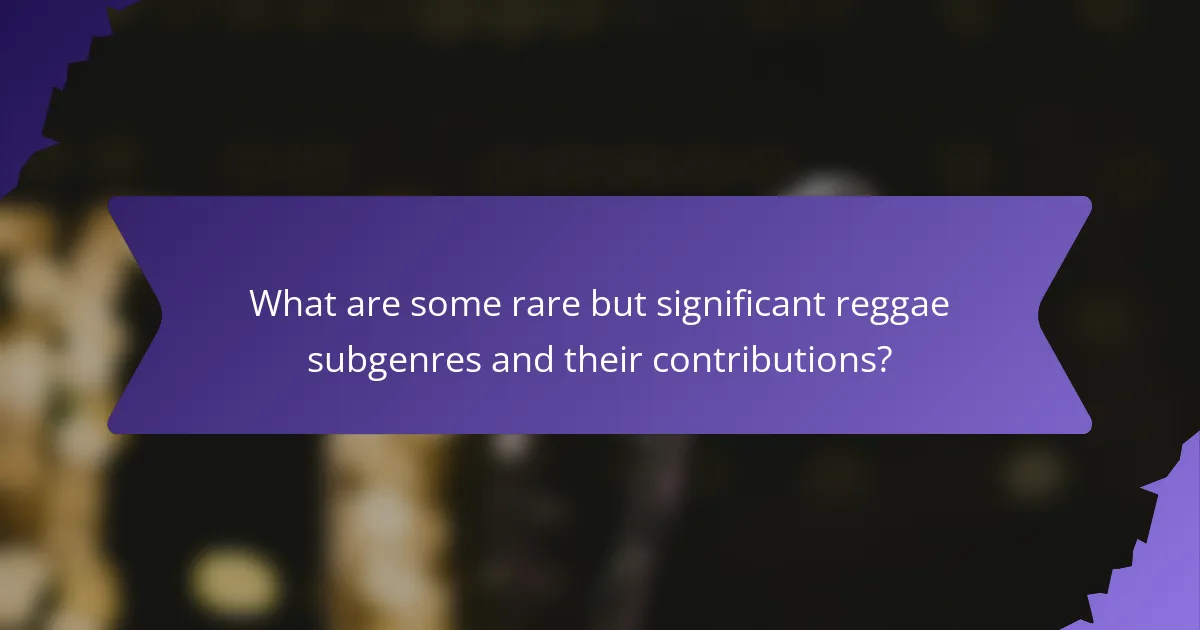
What are some rare but significant reggae subgenres and their contributions?
Some rare but significant reggae subgenres include Dub, Rocksteady, and Reggae Fusion. Each contributes uniquely to reggae’s evolution and global influence.
Dub emerged in the 1960s, emphasizing instrumental versions of reggae tracks, enhancing sound effects, and creating a unique listening experience. Rocksteady, which preceded reggae, introduced slower tempos and romantic themes, setting a foundation for reggae’s lyrical depth. Reggae Fusion blends reggae with other genres like hip-hop and rock, showcasing reggae’s adaptability and broad appeal.
These subgenres illustrate reggae’s rich tapestry, reflecting social messages and cultural narratives while influencing music worldwide.
How do dub and roots reggae differ in their approach and sound?
Dub and roots reggae differ primarily in sound and approach. Roots reggae emphasizes social and spiritual messages with a steady, melodic rhythm, while dub focuses on instrumental versions, heavy bass, and sound manipulation.
Roots reggae often features lyrics that address social issues, promoting unity and resistance. In contrast, dub relies on remixing, echo effects, and reverb, creating an experimental soundscape. This unique attribute of dub allows for creative freedom, setting it apart from the more traditional roots reggae.
Both genres share a common origin in Jamaican music, but their distinct styles cater to different audiences and experiences. Roots reggae fosters a sense of community through its messages, whereas dub invites listeners into a sonic exploration, showcasing the versatility of reggae music.
What is the significance of ska and rocksteady in reggae’s lineage?
Ska and rocksteady are significant in reggae’s lineage as they laid the foundational rhythms and social messages that shaped the genre. Ska emerged in the late 1950s, characterized by its upbeat tempo and offbeat guitar strumming. Rocksteady followed in the mid-1960s, slowing the tempo and emphasizing bass lines, which influenced reggae’s development. Both styles addressed social issues, reflecting the struggles and aspirations of Jamaican society. Their unique attributes, such as ska’s energetic danceability and rocksteady’s laid-back groove, contributed to reggae’s global appeal and cultural significance.
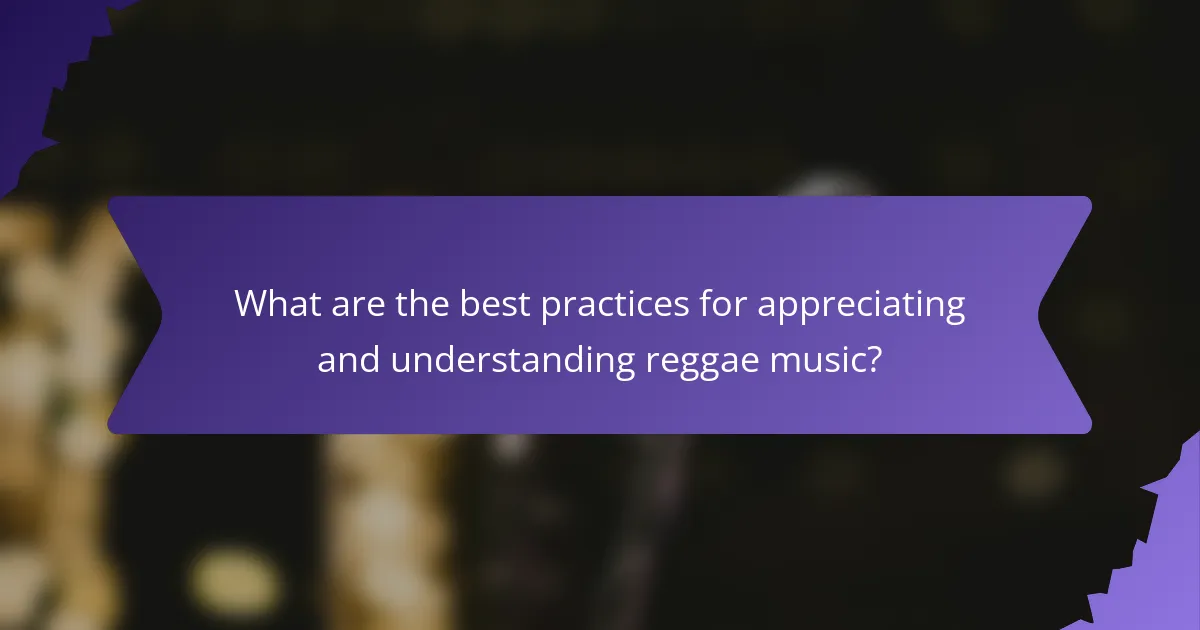
What are the best practices for appreciating and understanding reggae music?
To appreciate and understand reggae music, immerse yourself in its cultural roots, social messages, and global impact. Start by exploring the genre’s origins in Jamaica during the late 1960s, where it emerged from ska and rocksteady. Recognize the powerful social messages in reggae lyrics, often addressing themes like love, resistance, and social justice. Listen to influential artists such as Bob Marley, Peter Tosh, and Jimmy Cliff to grasp the genre’s essence. Attend live performances to experience the communal spirit and rhythm of reggae. Finally, engage with reggae’s evolution and its influence on other music genres worldwide.
How can listeners engage with reggae’s cultural context effectively?
Listeners can engage with reggae’s cultural context by immersing themselves in its historical roots and social messages. Understanding reggae’s origins in Jamaica reveals its connection to resistance, identity, and community. Participating in local reggae events fosters appreciation for its cultural significance. Engaging with artists through interviews or documentaries enhances insights into their messages. Exploring reggae’s global influence shows how it promotes unity and social justice worldwide. Listening to various reggae subgenres broadens perspectives on its evolution and diversity.
What common misconceptions about reggae should be avoided?
Common misconceptions about reggae include the belief that it is solely about Rastafarianism, that all reggae music sounds the same, and that it lacks depth in social commentary. Reggae encompasses diverse themes, including love, struggle, and resilience, reflecting a wide range of cultural influences. Additionally, many associate reggae exclusively with Bob Marley, overlooking numerous influential artists and styles within the genre. Understanding these misconceptions enhances appreciation for reggae’s rich history and global impact.